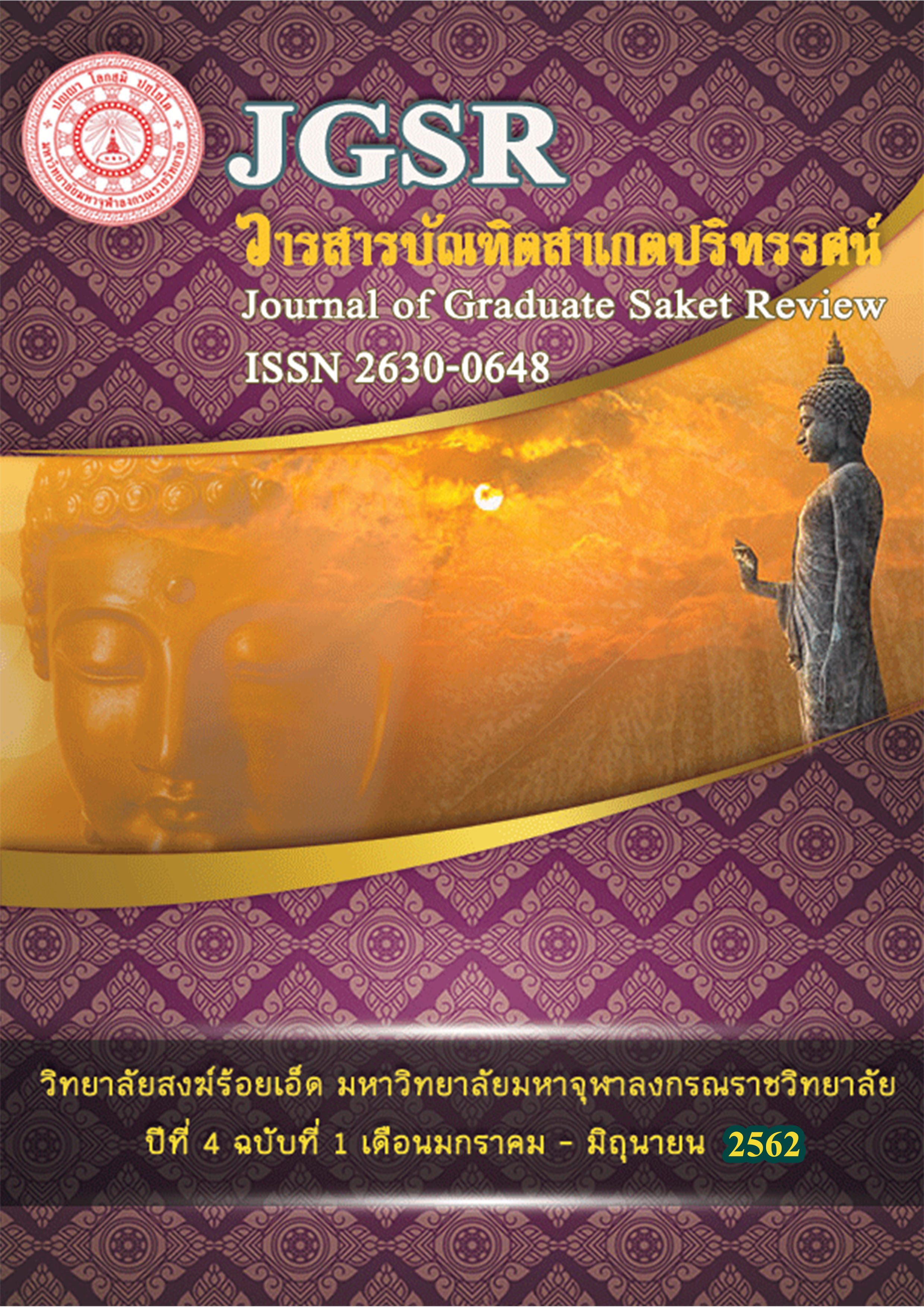บทบาทของพระพุทธศาสนาที่มีในเครือข่ายสังคมออนไลน์“เฟซบุ๊ค”
Main Article Content
บทคัดย่อ
บทความวิจัยเรื่องนี้มีวัตถุประสงค์ของการศึกษาอยู่ 3 ประการคือ 1) เพื่อศึกษาบทบาทของพระพุทธศาสนาในสังคมไทยที่ปรากฏบนเฟซบุ๊ค 2) เพื่อเสนอภาพตัวแทนของพระพุทธศาสนาในสังคมไทยที่ปรากฏบนเฟซบุ๊คและ3) เพื่อวิเคราะห์บทบาทของพระพุทธศาสนาในสังคมไทยที่ปรากฏบนเฟซบุ๊ค
ผลการวิจัยพบว่า เครือข่ายสังคมออนไลน์ คือ เฟซบุ๊คนี้ได้สะท้อนบทบาทของพระพุทธศาสนาครบทั้ง 7 มิติ ได้แก่ มิติด้านการปฏิบัติและการเจริญสมาธิภาวนามิติด้านหลักธรรมและคำสอนมิติด้านตำนานปรัมปรามิติด้านประสบการณ์ทางศาสนามิติด้านศีลธรรมมิติด้านสังคมและสถาบันมิติด้านศิลปวัตถุกล่าวให้ชัดขึ้นก็คือ ปรากฏการณ์ของพระพุทธศาสนาบนโปรไฟล์ต่างๆ ที่ได้ทำการคัดเลือกไว้ ได้แก่ โปรไฟล์ “PhraPaisalVisalo” ทั้งที่เป็นส่วนตัวและสาธารณะของพระไพศาล วิสาโล, โปรไฟล์ “พระมหาวุฒิชัย วชิรเมธี” และ ว. วชิรเมธี (W.Vajiramedhi) ซึ่งเป็นสองโปรไฟล์สาธารณะของพระมหาวุฒิชัย วชิรเมธี, โปรไฟล์“หอจดหมายเหตุพุทธทาส อินทปัญโญ: BuddhadasaIndapanno Archives”ซึ่งเป็นโปรไฟล์สาธารณะของหอจดหมายเหตุพุทธทาส อินทปัญโญ, โปรไฟล์ “เสถียรธรรมสถานSathiraDhammasathan”ซึ่งเป็นโปรไฟล์สาธารณะของเสถียรธรรมสถานพบว่าปรากฏการณ์ ของพระพุทธศาสนาได้แสดงออกให้เห็นครบทุกมิติ ยกเว้น โปรไฟล์ “Tilopa House” ซึ่งเป็น โปรไฟล์สาธารณะของบ้านตีโลปะ โดย วิจักขณ์ พานิช ที่ไม่ปรากฏมิติด้านเรื่องเล่าและ ปรัมปราคติ
บทบาทของพระพุทธศาสนาที่แสดงออกผ่านมิติของศาสนา ยังได้สะท้อนภาพตัวแทนของพระพุทธศาสนาในสังคมไทยที่ปรากฏบนเฟซบุ๊คไว้อยู่ 5 ความหมาย คือ (1) “พระพุทธศาสนาแบบเน้นโลกนี้” (2) “พระพุทธศาสนาแบบไม่ผูกติดกับความเชื่อใดความเชื่อหนึ่ง” (3) “พระพุทธศาสนาแบบสำนึกในคุณค่าของธรรมชาติ” (4) “พระพุทธศาสนาแบบสังคมฆราวาส และ (5) “พระพุทธศาสนาแบบกระแสโต้” ทั้งนี้ภาพตัวแทนต่างๆ ที่ถูกประกอบสร้างขึ้นมานั้น กล่าวได้ว่าเป็นผลจากความเปลี่ยนแปลงของกระแสโลก คือ โลกาภิวัตน์ ผนวกกับกระแสความเจริญรุดหน้าของสื่อใหม่ ซึ่งก็คือ เฟซบุ๊คอันควรกล่าวได้ว่าเป็น “เงื่อนไข” หลักที่ขับเน้นให้พระพุทธศาสนาเกิดการปรับเปลี่ยน “ตำแหน่งแห่งที่” ของตนเองในยุคปัจจุบันอย่างสำคัญ
Article Details
เนื้อหาและข้อมูลในบทความที่ลงตีพิมพ์ในวารสารบัณฑิตสาเกตปริทรรศน์ ถือเป็นข้อคิดเห็นและความรับผิดชอบของผู้เขียนบทความโดยตรงซึ่งกองบรรณาธิการวารสาร ไม่จำเป็นต้องเห็นด้วย หรือร่วมรับผิดชอบใด ๆบทความ ข้อมูล เนื้อหา รูปภาพ ฯลฯ ที่ได้รับการตีพิมพ์ในวารสารบัณฑิตสาเกตปริทรรศน์ ถือเป็นลิขสิทธิ์ของวารสารบัณฑิตสาเกตปริทรรศน์ หากบุคคลหรือหน่วยงานใดต้องการนำทั้งหมดหรือส่วนหนึ่งส่วนใดไปเผยแพร่ต่อหรือเพื่อกระทำการใด ๆ จะต้องได้รับอนุญาตเป็นลายลักอักษรจากวารสารบัณฑิตสาเกตปริทรรศน์ ก่อนเท่านั้น
เอกสารอ้างอิง
กาญจนา แก้วเทพ. (2539). สื่อส่องวัฒนธรรม. กรุงเทพมหานคร :อมรินทร์.
กาญจนา แก้วเทพและสมสุข หินวิมาน. (2551). สายธารแห่งนักคิดทฤษฎีเศรษฐศาสตร์การเมืองกับสื่อสารศึกษา. กรุงเทพมหานคร
: ภาพพิมพ์.
ไชยรัตน์ เจริญสินโอฬาร. (2545). ขบวนการเคลื่อนไหวทางสังคมรูปแบบใหม่. พิมพ์ครั้งที่ 2. กรุงเทพมหานคร: วิภาษา.
ไชยรัตน์ เจริญสินโอฬาร. (2545). สัญวิทยา โครงสร้างนิยม หลังโครงสร้างนิยมกับการศึกษารัฐศาสตร์. กรุงเทพมหานคร : วิภาษา.
ประทุมพร วัชรเสถียร. (2548). โลกร่วมสมัย: ตอบคำถามของคนรุ่นใหม่. กรุงเทพมหานคร: ปาเจรา.
พระธรรมปิฎก (ป.อ.ปยุตฺโต). (2543). ความสำคัญของพระพุทธศาสนาในฐานะศาสนาประจำชาติ. พิมพ์ครั้งที่ 10. กรุงเทพมหานคร
: สหธรรมิก.
ราชบัณฑิตยสถาน. (2549). พจนานุกรมศัพท์สังคมวิทยาอังกฤษ – ไทย. พิมพ์ครั้งที่ 3. กรุงเทพมหานคร: ราชบัณฑิตยสถาน.
โรล็องด์ บาร์ตส์. (2551). มายาคติ. แปลโดย วรรณพิมล อังคศิริสรรพ. พิมพ์ครั้งที่ 3. กรุงเทพมหานคร : คบไฟ.
วิทยากร เชียงกูล. (2547). อธิบายศัพท์ใหม่เพื่อเข้าใจโลกยุคใหม่. พิมพ์ครั้งที่ 2. กรุงเทพมหานคร : สายธาร.
สุริชัย หวันแก้ว. (2546). กระบวนการกลายเป็นคนชายขอบ Marginalization. กรุงเทพมหานคร: คณะกรรมการสภาวิจัยแห่งชาติ
สาขาสังคมวิทยา สำนักงานคณะกรรมการวิจัยแห่งชาติ.
อานันท์ กาญจนพันธุ์. (2545). เส้นผมบังภูเขา: ความคิดสามัญเชิงวิพากษ์. กรุงเทพมหานคร: เคล็ดไทย.
เอก ตั้งทรัพย์วัฒนา. (2548). โลกาภิวัตน์ บรรษัทข้ามชาติ. กรุงเทพมหานคร : สำนักพิมพ์แห่งจุฬาลงกรณ์มหาวิทยาลัย.
Appadurai, Arjun. (1996). Modernity at Large : Cultural Dimension of Globalization. Minneapolis: University of
Minnesota Press.
Beck, Ulrich. (1992). Risk Society: Towards a New Modernity. London: Sage.
Rosenau, James N. (1997). Along the Domestic-Foreign Frontier: Exploring Governance in a Turbulent World.
Cambridge: Cambridge University Press.
Urry John. (2003). Global Complexity. Cambridge: Polity.


